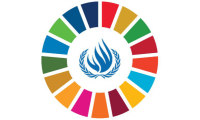Database to ensure accountable sustainable development

The Danish Institute for Human Rights (DIHR) has launched a database that will make the wealth of quality information from the UN human rights monitoring system more accessible for sustainable development actors. The UPR-SDG Data Explorer is the outcome of an experimental data mining project that aimed to link all existing UPR recommendations to the SDGs – more than 50,000 in total.
“The 2030 Agenda for Sustainable Development is anchored in human rights, and the overlap between provisions of human rights and the SDGs is considerable. Recommendations issued by the human rights monitoring system therefore hold valuable information and give practical advice to ensure that sustainable development policies are accountable and leave no one behind”, says Eva Grambye, Deputy Executive Director at DIHR.
The Universal Periodic Review (UPR) is a peer review mechanism of the UN Human Rights Council. Member States of the UN review one another in a recurring cycle, and issue recommendations to improve the human rights situation around the world.
“The UPR-SDG Data Explorer will be a gateway to take a rights-based approach to sustainable development. UPR recommendations accepted by governments give a consensus-based guidance for policy planners, which can make their implementation of the 2030 Agenda more efficient, streamlined and coherent, all while enhancing accountability towards citizens,” says Eva Grambye.The team behind the database has developed and trained an algorithm to identify relevant recommendations based on terms and expressions used in the text. The results of this project are now available for the first time, allowing stakeholders to explore the connections in an interactive way.
While the SDGs provide an overarching policy framework, UPR recommendations can point to marginalized groups in danger of falling behind, and suggest concrete measures to overcome discrimination. The data shows that more than half of all recommendations can be linked directly to specific targets of the 2030 Agenda, illustrating the significant potential of an integrated rights-based approach.
This potential is equally recognized by the Office of the High Commissioner for Human Rights (OHCHR), whose Universal Human Rights Index database forms the basis of the analysis.
“This tool will facilitate the work of the human rights community around the world, including not least our own colleagues in the field,” says Adam Abdelmoula, Director, Human Rights Council and Treaty Mechanisms Division at OHCHR. Further, this potential is far from being exhausted:
“Beyond the UPR, our experts from Treaty Monitoring Bodies and Special Procedures of the Human Rights Council continuously issue a stream of valuable observations and recommendations that need to be thematically indexed and linked to the 2030 Agenda. The tool that DIHR has developed will be a great help to reduce the burden of this work on our staff,” says Adam Abdelmoula.
The new database is part of a pilot project intended to pave the way for further collaboration between DIHR and OHCHR on the extraction of data from the human rights system. It is one of the joint areas of work under the Memorandum of Understanding between the two organisations, signed in December last year. Building on the experience gained with the UPR recommendations, additional human rights data will be analysed over the coming months.
To analyse the vast amount of UPR recommendations, the Danish Institute for Human Rights teamed up with the social enterprise Specialisterne – “the Specialists”. Specialisterne is a business consultancy that harnesses the special talents of their employees, the majority of whom have a diagnosis on the autism spectrum.
